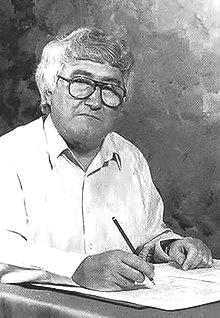LEGENDS OF
LIGHT MUSIC
Gordon Langford

For many years
Gordon Langford has been
recognised as a fine pianist.
People who take the trouble to
check composers’ names will
also recognise him for his brass
band music. Light music admirers
first came across the March from
his ‘Colour Suite’ as
long ago as 1970 when it was
recorded by Sir Vivian Dunn and
the Light Music Society
Orchestra. Collectors of
production music know him from
titles such as ‘Royal
Daffodil’ and
‘Hebridean Hoedown’.
But his
pre-eminence also as an arranger
and orchestrator of other
people's music has tended to
obscure the fact that Gordon
Langford is an important composer
in his own right. Although nearly
all his music for bands -
military (concert) and brass - is
commercially recorded, very
little of his original music for
orchestra has found its way into
the record shops.
Born in Edgware,
North London in 1930, Langford
soon showed an interest in
performing and writing music and
had piano lessons from the age of
five. When he was aged nine, one
of his compositions received a
public performance, and two years
later he was the concert soloist
in Mozart's Piano Concerto in A
major, KV 488. He went on to win
a Middlesex Scholarship to the
Royal Academy of Music, and
included the trombone in his
musical studies. During his army
service he was a member of the
Royal Artillery Band, making his
first BBC broadcast as solo
pianist with the Band in 1951.
For several years
he worked as pianist with seaside
orchestras, at ballet schools and
in restaurants, as trombonist
with a touring opera company,
vibraphone player with a jazz
group, and as a ship's musician.
During the 1960s he was
increasingly featured as pianist,
arranger and composer on BBC
programmes such as Music in the
Air, Melody around the World,
Ronnie Barker's Lines from
MyGrandfather's Forehead, Hubert
Gregg's Thanks for the Memory,
Friday Night Is Music Night, The
Radio Orchestra Show and At the
Piano, also making appearances at
the Light Music Festivals in the
Royal Festival Hall.
He has written
many arrangements for The King's
Singers and numerous original
works for brass band (including
London Miniatures for the Philip
Jones Brass Ensemble), for
various chamber ensembles, and
for orchestra, the BBC
commissioning him to write a
Grand Fantasia on La Bohemefor
the centenary of the Henry Wood
Promenade Concerts at the Royal
Albert Hall in 1994. He won an
Ivor Novello Award for the March
from his Colour Suite in 1971,
has twice won the European
Broadcasting Union's competition
for new music for brass, and in
1994 was awarded the Gold Badge
of Merit by the British Academy
of Songwriters, Composers and
Authors.
He has worked as
an orchestrator for several
musical shows in London's West
End and for films such as Raiders
of the Lost Ark, Superman II,
First Great Train Robbery, Clash
of the Titans and Return to Oz.
His arrangements for brass and
military bands are widely
recorded, as are many of his
orchestral arrangements, notably
with Vernon and Maryetta Midgley,
Evelyn Glennie and Michala Petri.
He has featured on record as
pianist with Marilyn Hill Smith
and the late Max Jaffa.
Gordon Langford
now lives in East Devon, spending
most of his time composing,
whilst still making the
occasional recording, concert or
broadcast.
David Ades (2003)
The above
biography is based on the booklet
notes for the Chandos CD
"Gordon Langford’s
Orchestral Classics" (CHAN
10115). This features the BBC
Concert Orchestra Conducted by
Rumon Gamba playing:
Fanfare and
Ceremonial Prelude, Concertino
for Trumpet and orchestra, Four
Movements for String Orchestra, A
Song for All Seasons, First Suite
of Dances, Greenways, Spirit of
London, The Hippodrome Waltz,
Pastorale & March from Colour
Suite.
|